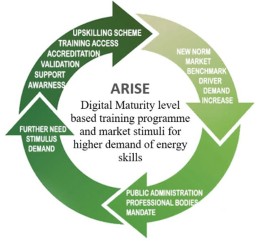Pilote case studies
ARISE pilot case studies will demonstrate the multi-criteria benefits of the application of new digitalisation skills towards energy efficiency, and the tailored qualifications scheme for recognised competencies.
This will consist of development/use of pilot samples of the matrix of competencies, learning outcomes, and training models and tools; implementation of the developed method in the form of wide-scale demonstration and tests across Europe; application of the method for representative recognition of competencies in sustainable energy skills trials, upskilling and capacity building; connecting to learning sources & micro-learning activities, development of additional learning and assessment sources and materials.
This will be achieved by the development of a framework to align ARISE training modules with CPD certification systems and preparation of guidelines for key market drivers on supportive and stimulating measures and regulatory requirements. This will establish appreciation and acceptance of sustainable energy skills in construction, stimulating market demand for the skills.
Learning content
The proposed learning content and tools will be based on the benching marking developed by the project and will also be reflective of the skills established within the Task based maturity framework. The learning content and tools will be available in the ARISE gamified training platform. The learning content will be based on micro (bite)-size modules providing to the users of the final platform a range of relevant micro modules choices, overcoming a traditional linear educational approach. The modules will be complemented through a digital certification pathway. This will provide pathways to progress from one qualification to another or to use micro modules acquired within one qualification to gain another qualification/ certificate. The micro size modules will be assessed using an AGILE methodology, which will enable adaptive planning, evolutionary development, early delivery, and continual improvement of the learning content and delivery platform. ARISE will aim to support innovation and promote continuous professional development in both energy and digital skills from a discipline perspective in an ongoing and sustainable manner; utilise digitalization to maximize sustainable energy competences and to make skilling attractive.
Gamified Training Platform
The gamification platform to encourage digital delivery through rewarding milestones of achievement for the user. The gamification engine enables trainees to earn points every time they complete each one of the predefined sub-goals and goals successfully. As more trainees are involved, keeping scores will become more important (it has been demonstrated that benchmarking progress is a vital gamification driver). They will only be able to keep score if they are succeeding. The system also provides badges, visual stamps that are unlocked when the user achieves designated targets.
All the points, badges, and levels achieved by the trainees can then be sent to the blockchain network, which will allow creating a large European repository for recognition and certification. ARISE will revolutionise the learning process by developing a crypto-skills exchange, monetizing the skills and learning interface with a system based on skills recognition rather than accreditation. The reward of acquiring a competence at a certain level will be CERTcoin the innovative currency of skills and learning of the construction sector embracing today’s digital transformation benefits.
Task-based qualification Framework
The task-based qualification framework will encompass skills on Renewable Energy Systems (RES), Energy Efficiency (EE), Energy Performance in Buildings (EPB), and the use of BIM to improve energy performance (BIM4EP) utilising digitalisation as an accelerator. The result will be a novel task and skill maturity-based framework for inclusive digitalisation qualifications for energy skills filled with units of learning outcomes. The framework will be an extensible foundation for the ARISE Continuing Professional Development (CPD) system that will be implemented in ARISE training platform. It will enable both the generation of micro-learning Record Store compatible learning statements (usable for learning analytics) and unit of learning outcomes forming upskilling modules (usable as input for validated learning accomplishments by using blockchain).
Benchmarking energy and digitalization skills
ARISE project will benchmark the energy and digitalization skills by measuring the current level of energy and digitisation skills maturity, knowledge, and understanding within the built environment sector integrated with the process of digital transformation of the AEC industry, especially regarding drivers, barriers, and gaps.
The benchmark will be an updated review of state of the art, based on the most up to date literature and survey data and previous reports and EU projects that are still relevant, as well as an internal analysis of it. The analysis will also investigate the differences between the EU countries’ legislation, qualification, and certification systems.
The internal benchmark will analyse, evaluate, compare and suggest ways on how previous H2020 projects can be integrated in order to form the initial core strength of this project with a direct impact on the stimulus and increase of demand for energy skills. This follows up from the BIM-EPA work and contributes to the ongoing sustainability, reach, and impacts of previous EU funded projects. Such analyses will encompass elements such as previously developed frameworks, certifications, and qualifications, materials, IT resources/ platforms, learning outcomes, general outputs, and results. The Industry benchmark will continue further review of market gaps and drivers related to energy skills to be conducted, to be more effective when stimulating demand, and a technical stakeholder survey will be undertaken.
